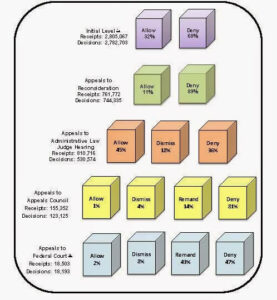
All claimants drawing disability benefits should be aware that Congress has increased funding for Continuing Disability Reviews. These are reviews that occur from time to time to make sure that claimants drawing disability benefits continue to be disabled.
The process usually starts with a questionnaire about recent medical care, and the request for a release to obtain updated medical records. Once the records are assembled, a judgment is made by a reviewing doctor (who does not examine the claimant) about whether there is evidence of a medical improvement. THERE MUST BE SOME EVIDENCE OF A MEDICAL IMPROVEMENT FOR BENEFITS TO BE CUT OFF.
If there is sufficient evidence of medical improvement to produce an ability to work, the claimant will be informed of that decision. If the claimant requests a review of the decision within ten days of receiving notice of it, he may continue receiving benefits while contesting it. If he loses the appeals, he will be expected to repay the benefits.
Claimants appealing the denial get a very informal hearing on the Reconsideration level of review. This is different from the procedure on initial application, in which the only hearing occurs after the Reconsideration level. If the Reconsideration decision is still unfavorable, the claimant may request a hearing before an Administrative Law Judge, and continue to receive the monthly check while waiting for the hearing.
Our tips for defending a continuing disability review are as follows. Always stay in your medical care, even before the CDR begins. Second, cooperate with the agency and send the paperwork back on time. Third, make sure your treating doctor knows what is going on, so that supportive remarks get into the medical file. Fourth, do contest any decision to cut you off (unless you have returned to work), at least through the Reconsideration level of review.
Younger individuals and children are the most at risk for having a claim reviewed. There are greater program savings to be achieved by cutting these people off.
Call or text (864) 235-0234 or complete a Free Case Evaluation form





